Antioxidants help you stay healthy as you age by neutralizing harmful free radicals that cause cellular damage and accelerate aging. By supporting your body’s natural defenses, they reduce oxidative stress, improve skin, eye, heart, and bone health, and boost your resilience. Consuming antioxidant-rich foods like fruits, vegetables, nuts, and spices, along with regular exercise, enhances these protective effects. Keep exploring to discover how to optimize your antioxidant strategies for better aging.
Key Takeaways
- Antioxidants neutralize reactive oxygen species (ROS), reducing cellular damage associated with aging.
- Dietary antioxidants from fruits, vegetables, nuts, and spices support cellular repair and skin, eye, and heart health.
- Endogenous antioxidant enzymes, supported by antioxidants, help maintain cellular resilience and delay age-related decline.
- Regular physical activity enhances antioxidant defenses by stimulating enzyme production and improving circulation.
- Supplementing antioxidants and adopting healthy lifestyles can slow aging processes and promote overall healthy aging.
Understanding Oxidative Stress and Aging
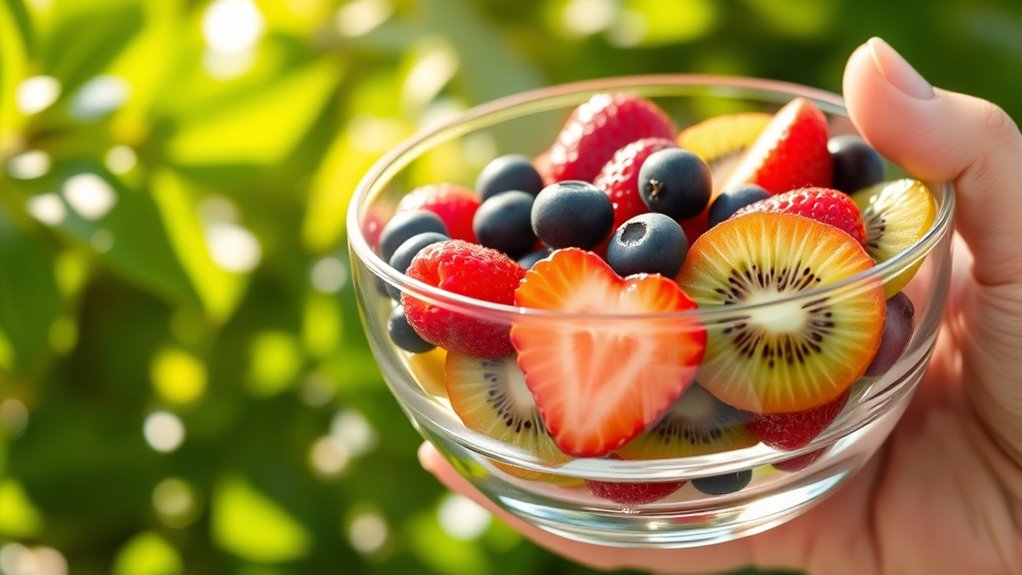
Have you ever wondered how our bodies age at the cellular level? It all comes down to oxidative stress, which happens when prooxidant molecules outweigh antioxidants. This imbalance causes damage to essential components like DNA, proteins, and lipids, impairing cell function. Mitochondria, the cell’s energy producers, become major sources of harmful reactive oxygen species (ROS), especially as we age. These ROS can accumulate, leading to cellular damage and promoting aging processes such as cellular senescence. Additionally, our natural antioxidant defenses decline over time, making it harder for our bodies to neutralize ROS. Understanding the mechanisms behind oxidative damage is crucial for developing strategies to promote healthy aging. This combination accelerates damage, contributing to aging-related changes and disease. In fact, the decline in antioxidant levels further hampers the body’s ability to combat oxidative stress, emphasizing the importance of maintaining a balance between prooxidants and antioxidants. Recognizing oxidative stress as a key factor in aging highlights the potential benefits of antioxidant-rich diets and therapies. Research indicates that free radicals are primary agents of cellular damage during aging, underscoring the importance of antioxidants in protecting our cells. Moreover, ongoing research explores how mitochondrial dysfunction contributes to increased oxidative stress and aging processes. Understanding this basic mechanism helps explain why managing oxidative stress is fundamental for healthy aging.
How Antioxidants Protect Cellular Health
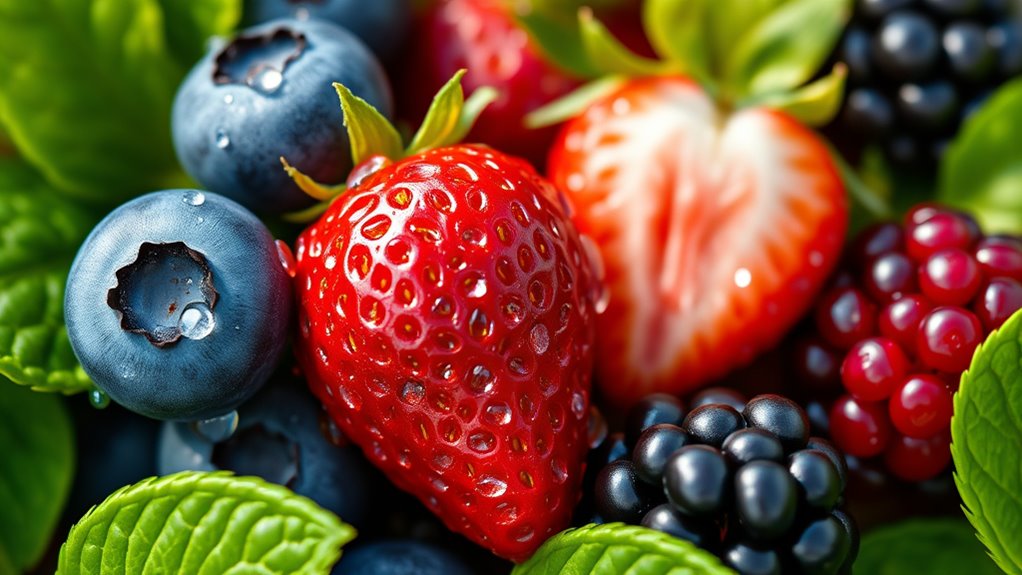
You can think of antioxidants as your cells’ defense team, neutralizing free radicals before they cause damage. They also support cell repair by fixing molecules that have been harmed by oxidative stress. This dual action helps keep your cellular health strong and your body functioning at its best. Staying aware of AI vulnerabilities can help ensure that technological advancements supporting health are safe and trustworthy. Understanding lifestyle factors that influence oxidative stress can further optimize your aging process. Incorporating a diet rich in antioxidant-rich foods such as fruits and vegetables can significantly enhance your body’s ability to combat oxidative damage. Additionally, ongoing research into machine learning algorithms is improving our understanding of how to better predict and mitigate cellular aging processes.
Subheading 1: Neutralize Free Radicals
Antioxidants protect cellular health by neutralizing free radicals, which are highly reactive molecules that can cause significant damage to cells. They do this by accepting or donating electrons, stabilizing free radicals before they harm cellular components like DNA, proteins, and lipids. Some antioxidants, like vitamins C and E, directly react with radicals such as hydroxyl or lipid peroxyl radicals, stopping chain reactions that lead to oxidative damage. Others work indirectly by inhibiting free radical formation or boosting the body’s antioxidant enzymes, like superoxide dismutase and glutathione peroxidase. Whether from diet or produced naturally, these defenses keep oxidative stress in check. Research supports the importance of antioxidants in maintaining cell integrity, preventing age-related decline, and supporting overall health. The effectiveness of antioxidants depends on their ability to reach and protect various cellular structures, highlighting the significance of proper intake and bioavailability. This process is essential for maintaining cell integrity, preventing age-related decline, and supporting overall health.
Subheading 2: Support Cell Repair
Supporting cellular health involves more than just neutralizing free radicals; it also requires active repair of damage caused by oxidative stress. Antioxidants boost enzymes like glutathione reductase and peroxidases that repair cellular injury. They also regenerate each other, such as vitamin C restoring vitamin E, maintaining a strong defense system. Additionally, antioxidant-rich foods can naturally support these repair mechanisms. Promoting cellular resilience through antioxidants enhances overall health and longevity. Enhancing endogenous systems like Nrf2 and sirtuins promotes repair and longevity. These processes, supported by cellular repair mechanisms, ensure your cells function at their best and resist damage over time.
Key Dietary Sources of Antioxidants
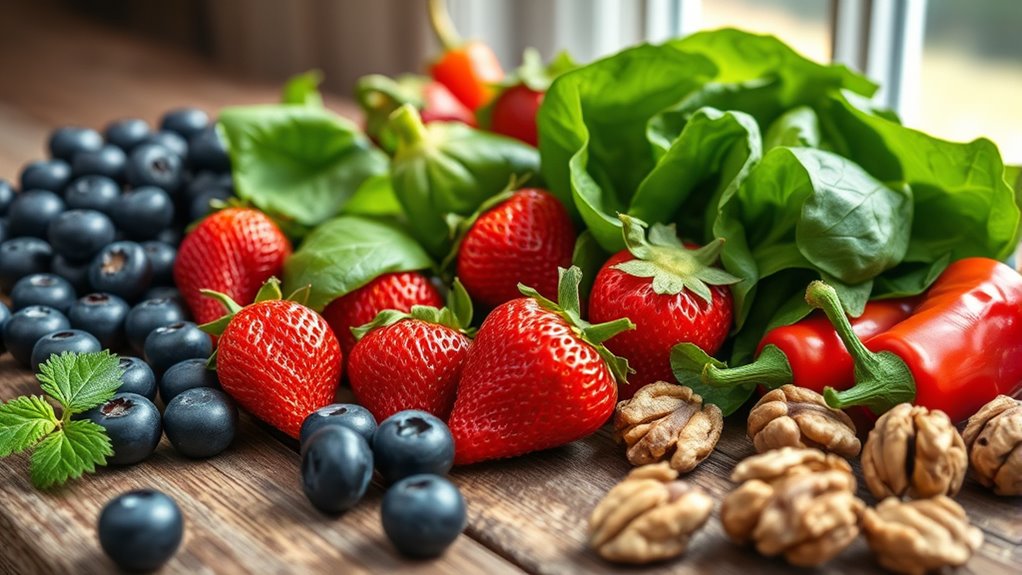
A variety of foods serve as rich sources of antioxidants, which help combat oxidative stress and promote healthy aging. Fruits like pomegranates contain flavonols, tannins, phenolic acids, and lignans that support heart health and skin protection. Pomegranate juice and seeds offer quick, nutritious antioxidant boosts. Avocados are high in monounsaturated fats and antioxidants that maintain healthy skin membranes and reduce free radical damage. Dark berries such as blackberries and black rice provide anthocyanins, which lower inflammation and benefit cardiovascular health. Dried fruits, with higher antioxidant ratios than fresh, serve as portable snack options. Vegetables like kale and spinach are packed with carotenoids, vitamins A, C, and K, supporting eye, heart, and bone health. Purple vegetables like sweet potatoes contain anthocyanins that reduce inflammation and promote overall health.
The Impact of Exercise on Antioxidant Defenses
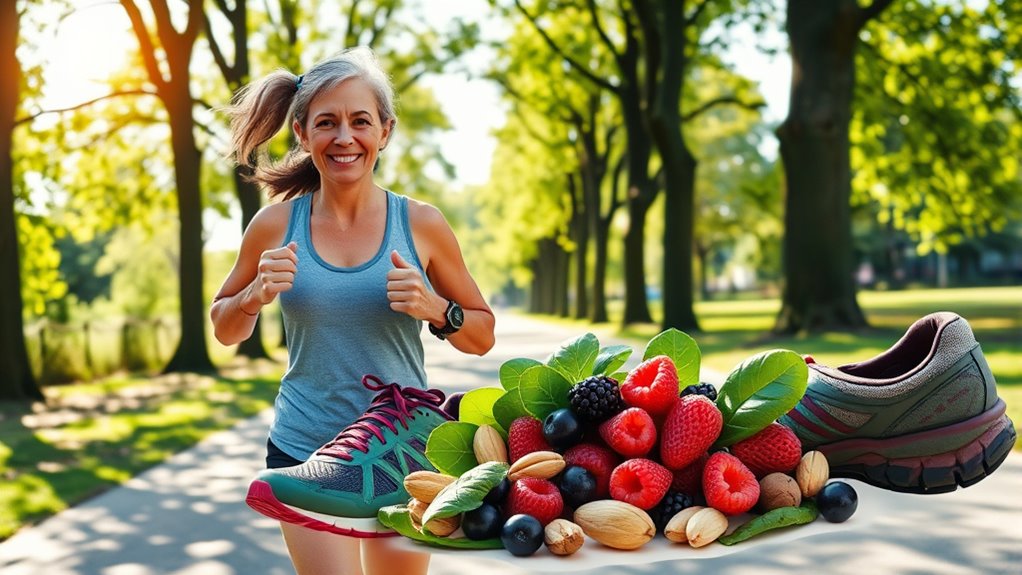
Regular exercise influences your body’s ability to defend against oxidative stress, but its effects are complex. While intense or prolonged workouts can temporarily increase reactive oxygen species (ROS), they also stimulate your antioxidant system over time. This adaptive process, known as hormesis, boosts enzymes like catalase and superoxide dismutase (SOD), strengthening your defenses. Different exercise types, such as aerobic or high-intensity training, can have varying impacts on oxidative stress levels. As you exercise regularly, your body learns to better manage oxidative damage, improving resilience across tissues. Additionally, engaging in consistent physical activity can promote the expression of antioxidant enzymes, further enhancing your body’s ability to combat oxidative stress. However, individual responses vary based on fitness and genetics. While initial oxidative stress might rise, consistent activity ultimately enhances your natural antioxidant capacity, helping you age healthier by reducing long-term oxidative damage.
Strategies to Support Healthy Aging With Antioxidants

To support healthy aging with antioxidants, focus on incorporating a variety of antioxidant-rich foods like fruits, vegetables, nuts, and whole grains into your diet. Staying active also boosts your body’s natural defenses against oxidative stress and inflammation. Incorporating sound healing science techniques, such as listening to specific frequencies or using sound vibrations, can further enhance your overall well-being and support cellular health. Additionally, understanding the role of oxidative stress in aging highlights the importance of consuming antioxidants to combat cellular damage. Engaging with biodiversity concepts by supporting local and sustainable food sources can also contribute to better health and environmental sustainability. Combining these strategies helps promote longevity and overall well-being as you age.
Incorporate Antioxidant-Rich Foods
Incorporating antioxidant-rich foods into your daily diet offers a practical way to support healthy aging. Add pomegranates and avocados to your meals for a boost of flavonoids, tannins, and healthy monounsaturated fats that promote heart and skin health. Pomegranates help reduce sun damage and support collagen production, while avocados maintain skin membrane integrity and combat free radicals. Include dark leafy greens like kale and spinach, which are packed with vitamins C, A, and K, protecting your eyes, heart, and bones. Incorporate cruciferous vegetables such as broccoli and Brussels sprouts for fiber and detox support. Snack on nuts and seeds like almonds and chia for antioxidants, healthy fats, and anti-inflammatory benefits. Use herbs and spices like turmeric to add flavor and extra antioxidant power effortlessly. Additionally, engaging in mindful eating can enhance nutrient absorption and overall health benefits. Research also suggests that certain skincare ingredients containing glycolic acid can improve skin texture and radiance, complementing your antioxidant-rich diet for overall healthy aging. Incorporating a variety of nutrients from different foods can further optimize your body’s ability to combat oxidative stress and promote longevity. Furthermore, consuming a balanced diet rich in diverse antioxidants ensures comprehensive support for your body’s aging process. Including functional foods like fermented products can also support gut health, which is closely linked to improved nutrient absorption and immune function.
Maintain Active Lifestyle
Maintaining an active lifestyle amplifies the benefits of antioxidant-rich foods by supporting your body’s ability to recover from exercise and reduce oxidative stress. Regular activity boosts circulation, helping antioxidants reach cells more efficiently. It also enhances your body’s natural ability to repair muscle damage and lower inflammation. To maximize these benefits:
- Engage in consistent aerobic and strength exercises to stimulate pathways like PGC1-α and MAPK, promoting muscle growth and endurance.
- Incorporate activities that improve vasodilation, such as brisk walking or cycling, enhancing oxygen delivery.
- Combine exercise with antioxidant-rich foods or supplements at ideal times to support cellular redox balance without impairing adaptive responses.
- Incorporating Kia Tuning modifications, such as suspension or engine upgrades, can also improve physical performance and recovery, further supporting an active lifestyle.
Engaging in mindful activity can also boost your antioxidant defenses, further supporting healthy aging.
Staying active not only improves overall health but also boosts your antioxidant defenses, supporting healthier aging.
Current Research and Evidence on Antioxidants and Aging

Recent research underscores the promising role of antioxidants in slowing biological aging, with studies demonstrating measurable benefits from supplementation and dietary intake. For example, using a natural antioxidant-rich blend called Cel System has shown a reduction in biological age after one year, along with increased muscle strength and improved body composition, indicating functional gains. Cel System targets pathways involved in the Hallmarks of Aging, suggesting mechanisms through which antioxidants may influence aging processes. Additionally, diets high in plant-based foods rich in antioxidants correlate with healthier aging in midlife adults. Reducing consumption of ultra-processed foods boosts natural antioxidant intake, supporting better health outcomes. While these findings are encouraging, ongoing research is needed to clarify long-term effects and the precise mechanisms by which antioxidants impact aging.
Future Directions in Antioxidant-Based Aging Interventions
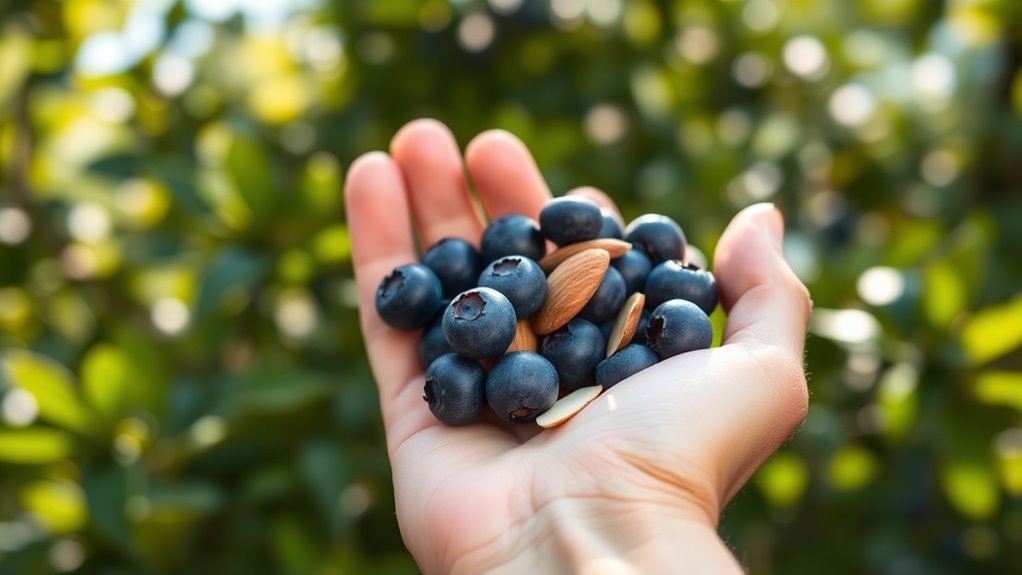
Advances in understanding how antioxidants influence aging are opening new avenues for targeted interventions. You can expect future strategies to focus on precise molecular targets, such as the NLRP3 inflammasome, and cell senescence through senolytics, reducing oxidative damage. Additionally, boosting vascular health by enhancing VEGF could promote longevity. You’ll also see more research into non-coding RNAs that modulate antioxidant responses and redox balance, alongside manipulating hepatic hydrogen sulfide production to delay aging.
- Developing delivery systems like nanotechnology to improve antioxidant bioavailability and tissue targeting.
- Combining physical activity with nutraceuticals for personalized anti-aging protocols.
- Using biomarkers and AI to tailor antioxidant therapies to individual needs.
Frequently Asked Questions
Can Antioxidant Supplements Replace a Healthy Diet for Aging?
You might wonder if antioxidant supplements can replace a healthy diet as you age. While supplements can offer some benefits, they can’t match the essential health support provided by nutrient-rich foods like fruits and vegetables. A balanced diet supplies a variety of antioxidants and bioactive compounds that work synergistically to promote healthy aging. Relying solely on supplements risks missing out on these vital nutrients, so prioritize whole foods for better aging support.
Are Synthetic Antioxidants as Effective as Natural Sources?
Imagine a battle between mighty synthetic and natural antioxidants—who wins? You might think synthetic ones are unbeatable because of stability and performance, but natural antioxidants pack a punch with their therapeutic potential and consumer-loved health benefits. While synthetics may outperform in some tests, natural sources often shine in safety and versatility. So, the effectiveness depends on what you value most—performance or natural goodness.
How Much Antioxidant Intake Is Optimal for Aging Health?
You’re wondering how much antioxidant intake is best for aging health. While there’s no one-size-fits-all answer, experts recommend consuming a balanced diet rich in fruits, vegetables, nuts, and seeds. Focus on variety and moderation, avoiding over-supplementation, which can be harmful. Regularly eating antioxidant-rich foods supports overall health, reduces oxidative stress, and may help prevent age-related conditions. Still, individual needs vary, so listen to your body and consult healthcare professionals when in doubt.
Do Antioxidants Have Any Side Effects or Risks?
You should be aware that antioxidants can have side effects and risks. Taking high doses, like vitamin E or beta-carotene, might cause serious health issues, interfere with exercise recovery, or even increase cancer risk in some groups, such as smokers. Excessive intake can lead to toxicity or birth defects. It’s best to stick to recommended amounts and consult your healthcare provider before starting high-dose supplements.
Can Antioxidants Reverse Existing Age-Related Cellular Damage?
Can antioxidants truly tackle and tame the tough, time-worn tissues of aging? Unfortunately, the answer’s complicated. While they may somewhat stabilize some cellular structures, antioxidants generally struggle to fully fix or reverse existing age-related damage. You might see some benefits, but they can’t completely erase the effects of aging. Instead, focusing on a balanced lifestyle, including diet and exercise, offers a more promising path toward healthy aging.
Conclusion
While some worry antioxidants might not fully prevent aging, embracing a balanced diet rich in antioxidants still benefits your cellular health. You don’t need perfect supplements—just include colorful fruits, vegetables, and stay active. These simple choices can boost your body’s defenses and promote healthier aging. Remember, it’s about consistent habits, not quick fixes. So, take small steps today to support your long-term well-being and enjoy a vibrant, healthier life.









